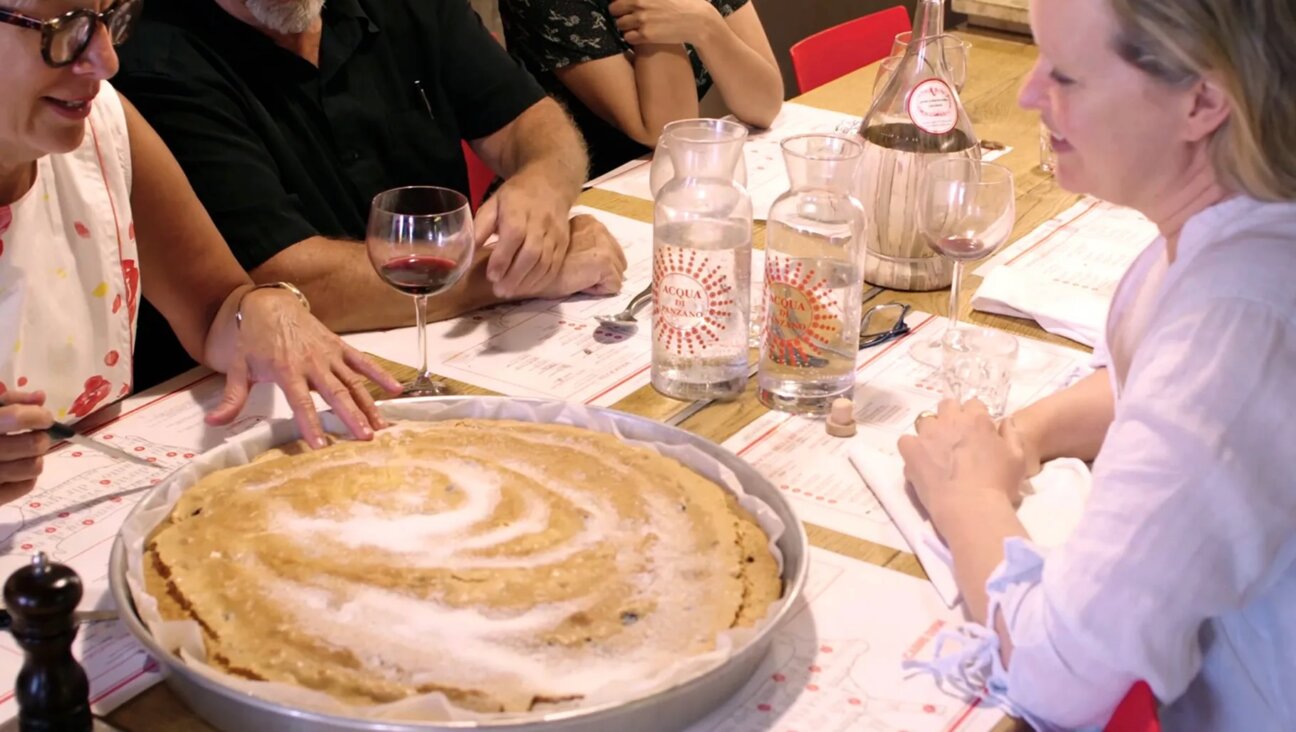Mamaliga Porridge With Plum Compote

Image by Leah Koenig
The ultimate Jewish breakfast porridge, Romanian mamaliga is served here with sour cream and a seasonal plum compote.
Last spring, , I traveled around Romania with my friends Julie and Benjy. Julie was also pregnant, right around 6 months like I was, and we saw the trip as a last hurrah before life got different.
I was also there to report some articles and Julie, who is originally American but living in Europe and fluent in Romanian, was acting as my interpreter and guide to the country. Her husband, Benjy, schlepped a lot of bags, bless him, and made for delightful company too.
While in Romania, Julie insisted we eat two things in quantity: ciorba (a sour soup, similar in tanginess to beet borscht) and mamaliga. The latter dish, a cornmeal porridge that closely resembles Italian polenta, is one of the country’s unofficial national foods. Romanians eat it for breakfast, lunch, dinner and dessert, stirred with butter, sour cream and cheese, drizzled with honey or spooned with jam and alongside hearty stews.
Before World War II, when Romania was home to a substantial Jewish population, Romanian Jews were as devoted to mamaliga as everyone else. The dish even made it into the famous 1920s Yiddish song, Roumania, Roumania by Aaron Lebedeff: “To live there is a pleasure / what your heart desires / you can get a mamaliga, a pastrami, a karnatzl (sausage) and a glass of wine, aha!”

Author Leah Koenig with her new cookbook. Image by Liza Schoenfein
And so, we pushed the boundaries of a dairy coma several times on that trip, tucking into massive bowls of mamaliga and sour cream with no inkling of guilt. Eating for two, and all that.
Back at home I still get cravings for mamaliga — mostly at breakfast when I have dipped into the oatmeal pot one too many times and am seeking something a little different. Like oatmeal, mamaliga transforms depending on how you dress it up. This summer, my topping of choice has been sweet and simple brown sugar plum compote. Every time I make it, I am reminded of my favorite breakfast poem, This is Just to Say, by William Carlos Williams.
These days I happily share my mamaliga with Max. But there is a part of me that also gets wistful for that glorious last bite of freedom in Romania. Aha!
Watch the Yiddish Forward’s Rukhl Schaechter make mamaliga.
Mamaliga With Brown Sugar Plums
Serves 4
For the compote:
1 cup orange juice
½ cup brown sugar
1½ pound plums, pitted and quartered
For the porridge:
1½ cups milk
1½ cups water
2 tablespoons unsalted butter
1 teaspoon salt
1 cup medium-grind yellow cornmeal (or polenta)
Sour cream, for serving
1) Stir the orange juice and brown sugar together in a medium saucepan set over medium heat. Bring to a simmer then let cook, stirring often, until the mixture begins to turn syrupy, 4–5 minutes.
2) Add the plums, turn heat down to medium-low, and gently stir to coat. Continue cooking, without stirring, until plums are tender but not falling apart, 5–10 minutes. Remove pan from heat and pour plums and their syrup into a glass bowl to cool. (Plums can be made 1 day in advance and stored, covered, in the fridge. Rewarm gently before serving, if desired.)
3) Combine the milk, water, butter and salt in a medium saucepan set over medium heat. Bring to a boil then add the cornmeal in a slow stream, stirring constantly.
4) Reduce the heat to low, cover the pan, and cook, stirring often, until the liquid is absorbed and the cornmeal thickens into porridge consistency, 5–15 minutes. Divide porridge into bowls and top with sour cream, a few plums and a generous drizzle of the plum syrup. Serve warm.
Leah Koenig is a contributing editor at the Forward and author of “Modern Jewish Cooking: Recipes & Customs for Today’s Kitchen,” Chronicle Books (2015).
A message from our Publisher & CEO Rachel Fishman Feddersen

I hope you appreciated this article. Before you go, I’d like to ask you to please support the Forward’s award-winning, nonprofit journalism so that we can be prepared for whatever news 2025 brings.
At a time when other newsrooms are closing or cutting back, the Forward has removed its paywall and invested additional resources to report on the ground from Israel and around the U.S. on the impact of the war, rising antisemitism and polarized discourse.
Readers like you make it all possible. Support our work by becoming a Forward Member and connect with our journalism and your community.
— Rachel Fishman Feddersen, Publisher and CEO























